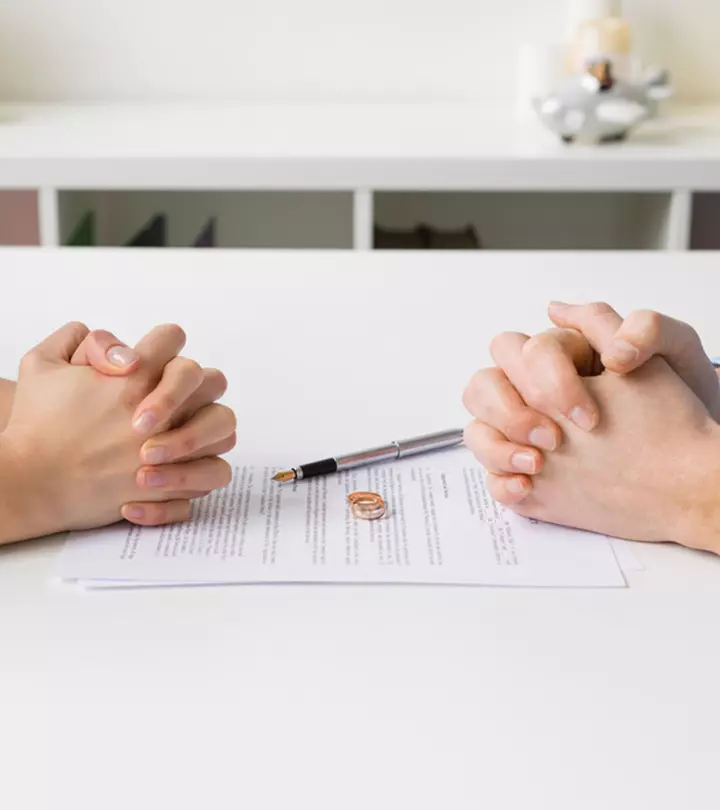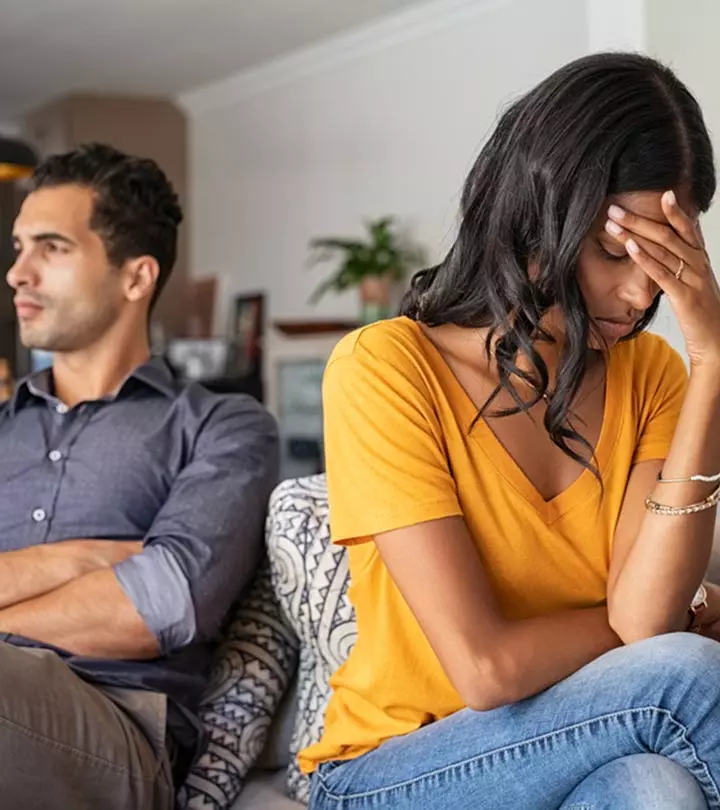Couples Therapy: Benefits, Who Should Consider, & What To Expect
Fill in the blanks and join the dots to bridge the gap between expectations and communication.

Image: Shutterstock
Couples therapy is often undervalued. This term is falsely associated with only the couples on the verge of falling apart. Relationship issues often require couples to seek help. Whether you are dating or in a marriage, it is natural to have conflicts, and you should also seek help when you need it. Therefore, talking to your therapist regularly about disagreements and grievances is important. You can improve your relationship by evaluating your issues and coming up with a plan of action. Read on if you are interested in couples’ therapy or curious about what it involves.
In This Article
What Is Couples Therapy?
Couples therapy helps in solving different issues between people in a romantic relationship or marriage. It is alternatively termed as marriage counseling or relationship counseling. Couples therapy or marital counseling engages trained and licensed marriage and family therapists (MFT) to deal with such issues. They help resolve interrelational conflicts and improve the relationship. Some of the common issues addressed in such counseling sessions are
- Building trust
- Improving communication
- Resolving conflict
- Giving you tools and strategies to manage anger
- Defining expectations and working on relationship goals
- Setting boundaries and sharing responsibilities
- Navigating specific life challenges
Couples therapy offers a host of benefits that improve a relationship. Check them out in the next section.
What Are The Benefits Of Couples Therapy?
Even if there is no specific issue, it is a good idea to go for couples counseling as it can help revitalize your relationship. It can equip you both with a better understanding of each other and the relationships. Some of the benefits of couples therapy include the following:
- Team Effort
This is a safe place to discuss past experiences without judgment. It helps the couple figure out the tools to handle issues as a team rather than as individuals. It is more effective than individual therapy when it comes to addressing relationship issues. But, it requires committed participants who are willing to work together and develop a fresh perspective.
- Helps Resolve Conflict
It is a safe place where you can communicate with your partner. A therapist acts as a buffer, a third party who will mitigate any issues or conflicts without causing any distress. They can help navigate the conversation without getting derailed. Most importantly, the therapist has an objective assessment of the relationship. They use the strategy of building love and repairing emotional bonds through forgiveness and reconciliation. This is especially effective for couples dealing with infidelity.
 Trivia
Trivia- Helps Heal Trauma And Wounds
Therapists have both the training and experience to identify the underlying psychological issues, risks, and emotional trauma affecting the relationship. This can help in bringing closure or helping you to work on trauma and grief. Any childhood abuse or deeply traumatic experience can spill over into adult relationships. The repercussions of such experiences need to be addressed for the individual to have healthy relationships.
- Improves Communication Skills
Most often, relationships crumble due to a lack of proper communication. Therapy can teach you how to improve the relationship by being intentional with your words and actions and setting boundaries and realistic expectations. As it is a safe place, therapy empowers you to voice your opinions. This is particularly important for people who are sensitive or overly empathetic or have low self-esteem.
- Helps Rekindle Passion And Romance
Over time, life becomes monotonous and passion fades. This can have a negative impact on a romantic relationship. Couples therapy works on equipping you with the necessary therapeutic aids to improve your sexual and emotional health. It can be difficult to communicate your needs to your partner, especially on sensitive topics such as sexual satisfaction and needs. Qualified professionals can handle these situations in a sensitive manner and teach you the skills to healthily manage any such conflicts.
Well, who is eligible for couples therapy? Are there any criteria? Scroll down to learn more.
Who Should Consider Couples Therapy?
Anyone, irrespective of their relationship status (dating, engaged, married, separated, or divorced), sexual orientation, race, or age can consider couples therapy. These factors, along with the dynamics of the individuals involved in the relationship, may bring unique challenges that need to be addressed by a licensed therapist. Ronald Hoang, a Relationship And Family Counselor, suggests, “If you find yourself stuck in a pattern that you can’t seem to break – this can be a good sign that having a professional who is neutral and impartial can be highly beneficial.”
However, do not wait until the situation worsens and things go out of your hands. Ronald further adds, “Therapy can work as a preventative measure as well, and in many cases, it can be more effective, because we’re not having to untangle a large knot that has been tightened and grown over many years. It’s being proactive rather than reactive.”
People experiencing the following problems can especially benefit from couples therapy:
1. Lack Of Communication
Misunderstandings are common in relationships. But, they get out of hand when there is miscommunication or worse – no communication. This can escalate the fights and lead to bitterness and resentment. Most couples need to learn how to talk to each other during disagreements without taking it personally. So, couples who often find it hard to see eye to eye should consider couples therapy so they can handle the situation maturely.
Savannah Wingo, a blogger, shared her experience with taking couples therapy with her boyfriend. She wrote, “My boyfriend and I first went to couple’s therapy together in 2015. We’d been together less than a year, but were having some trouble communicating as we transitioned to living together full-time (i).”
2. Trust Issues
We all have our insecurities, but when we do not address them, they can create problems in the relationship. Many relationships are lost due to trust issues. The question is, why don’t you trust your partner? Is their behavior sketchy? Did they show any signs of being unreliable? Or is it your deep-rooted insecurity or fear of abandonment causing this mistrust? These questions can only be answered when you work together as a team. Couples counseling gives you a safe space to explore and deal with such problems.
3. Child Custody
Marital counseling is important when you are planning to separate or divorce. It helps in adjusting to the changes in the relationship. Having a qualified professional to steer the conversations and provide objective feedback can be instrumental in an amicable separation. This is especially important when a couple is fighting over their children’s custody. Ronald suggests, “In this situation, it can help parents with co-parenting and keeping children out of the middle of the adult conflict. Therapy is usually done separately (the couple does not sit in the same room) and the focus is on the child – doing what is best and most beneficial for the kids.”
4. Infidelity
Infidelity can cause deep-seated resentment in a relationship. Often, people stonewall their cheating partners, which can be detrimental to the future of the relationship. Despite learning of the affair, there are a lot of questions surrounding the experience that the couples need to delve into without losing their temper or composure. Marital counseling offers the necessary tools and strategies to deal with such situations. It can also help you figure out if you want to stay together or go your separate ways.
5. Jealousy
Jealousy is one of the strongest human emotions. It is a motivating factor behind many crimes of passion. The key is to nip it in the bud! Couples experiencing intense jealousy who seek timely counseling can resolve many misunderstandings. If both the parties involved make an effort to understand each other, they can develop a strong relationship.
6. Parenting
Couples therapy can be an excellent tool for couples to address the issues regarding parenting. Many people have conflicting ideas about how to raise a child. If these issues are not resolved, they can damage the growth and development of the child. Issues in parenting are unique to the couple, but they can easily be resolved with strategies and insights from the therapist.
 Did You Know?
Did You Know?7. Addiction
Gambling, drugs, alcohol, porn – there are endless types of addiction out there. An addiction can create havoc in a relationship. Though it requires therapy at an individual level, it is important to seek guidance as a couple as well. After all, one partner’s addiction affects the other partner as well. Rehabilitating from such addictions requires a lot of care, understanding, patience, and attention. This can be very difficult for the caregiver or non-addict partner. Couples counseling can help in providing proper support to the individual in question.
8. Narcissism
Narcissism is one of the several damaging personality traits that need therapy. If your partner is narcissistic, it is imperative that you seek counseling along with them. People with this personality disorder can be highly manipulative, demanding, and controlling. Gaslighting is another common manipulative technique used in such relationships. This breaks the confidence of the other partner, who constantly second-guesses themselves. A therapist can help the narcissistic partner see things from a different perspective. Therapy as a couple can also put such issues to rest or at least offer some form of closure.
9. Domestic Violence
Both the perpetrator and the victim of domestic violence need therapy. Couples therapy is a great option for them to talk about their problems. The therapist can help navigate this delicate situation, where both the individuals are not deprived of respect and dignity.
Note: Most therapists view domestic violence as a red flag and would not suggest couples therapy in such cases. A minority of therapists may still proceed to stop the violence. However, this is a delicate area of work, requiring specialized training, and not all therapists are trained for this.
10. Sexual Problems
It is normal to have sexual problems in a relationship. Every individual has different needs. The needs can change depending on the emotional, hormonal, physical, and mental health of the person. It is important to communicate these differences and work together for a healthy relationship. A therapist can help you open up about these sensitive topics without judgment, anger, and resentment.
11. Debt
Financial difficulties or discrepancies in financial habits can create a rift between partners. One partner can be a saver while the other is a spender. This is very common in relationships. Thus, it is important to discuss monetary or property details with transparency. A couple lawfully (in many states) shares financial responsibilities such as loans, mortgages, and debts. So, it is important to be on the same page with your partner regarding major financial decisions.
Counseling offers a safe environment to discuss these issues and even helps address underlying problems such as lack of trust, addictions, or infidelity.
12. Incompatibility
No couple is perfectly compatible! They may have common interests, but it is inevitable for them to have differences of opinion on many things. That’s why it is important to learn how to negotiate any disagreements or disputes amicably. Couples therapy provides the best outlet to air out any grievances and helps the couple reach a compromise. It also equips them to deal with future arguments with maturity and understanding.
13. Grief
Unprocessed grief needs to be channeled in a healthy way. Otherwise, it can lead to problems in a relationship. Losing a loved one, especially a child, can be a traumatic experience. This can often drive a wedge between the couple. A therapist can help you both process your grief so you can reconcile any differences.
You can have regular sessions or check-up sessions if you just want to improve your relationship or spice up your marriage. For deeper issues such as building trust, recovering from addiction, or emotional trauma, the frequency of sessions is determined by the therapist. It all depends on the willingness of the couple to cooperate with each other to resolve the issue.
How are conflicts resolved? Are there any specific techniques? Find out more in the section below.
What Are The Most Common Types Of Couples Therapy?
Although there are many types of therapy, the three most common approaches to couples counseling are the following:
1. Gottman Method
This type of therapy focuses on resolving conflicts through communication instead of criticizing or stonewalling the partner. It also does not encourage being defensive or contemptuous toward the partner. Dr. John Gottman talked about this method in detail in his book titled ‘The 7 Principles of Making Marriage Work.’
2. Emotionally Focused Therapy (EFT)
This method involves paying attention to the emotional status and needs of each other. It suggests that people involved in the relationship must establish an emotional connection or form an attachment bond in which they feel safe with each other.
3. Imago Relationship Therapy
The main focus of this type of therapy is to engage with your partner by listening to them so they feel understood. This entails repeating the dialogue in the conversation, especially during conflict. This therapy was developed by a married couple – Harville Hendrix and Helen LaKelly Hunt – and is published in a book titled ‘Getting the Love You Want.’
Alternative approaches to couples counseling include behavioral therapy and discernment counseling.
- Cognitive Behavioral Therapy
Cognitive behavioral therapy (CBT) helps you work on your negative emotions and feelings. The therapist helps you understand the link between your thoughts, feelings, emotions, and actions. This is further categorized into behavioral couple therapy (BCT), traditional behavioral couple therapy (TBCT), and integrative behavioral couple therapy (IBCT).
- Discernment Counseling
This type of counseling comes in handy when one of the partners is not interested in counseling. The therapist helps you work on coming to a common meeting point or even help couples with different goals or agendas.
Additionally, a meta-analysis study was conducted to analyze the effectiveness of behavioral couple therapy and emotionally focused couple therapy. The study consisted of 33 studies with 2730 participants, and it was deduced that both therapies had a medium level of effectiveness in helping couples minimize distress in their relationship, of which behavioral therapy had a slightly better impact than emotional therapy.
These are some of the commonly used methods to build trust and improve communication. Keep reading to prepare yourself if you are considering couples therapy.
What To Expect In Couples Therapy?
Most couples therapy starts off with questions to assess the relationship. The therapist will take note of your personal history, relationship status, sexual health, medical (psychological) records, and basic family background.
If you have a specific issue, the therapist may walk you both through the conversation, intervening whenever deemed necessary. In more complex cases, the counselor will bring to notice the underlying problems. They will also help you navigate these issues by providing exercises to improve your sexual, mental, and emotional health.
Sessions usually last about 45 minutes to an hour. The average number of sessions is 12, but this depends on the individual needs of the couple and the discretion of the therapist.
Prepare to be open-minded when you attend such sessions. Try to maintain a good working rapport with the therapist. Remember that they are on your side. Willingness to work together is crucial for this to work.
There are several factors to keep in mind when choosing a therapist. Their qualifications, credentials, area of expertise, experience, testimonials, location, cost, and insurance coverage are some basic things that you can look into. You can also try out multiple therapists till you find one you both feel comfortable with.
The most common mistake people make is to neglect the need for therapy. Scroll down to learn more.
Why Do Couples Delay In Receiving Therapy?
Most couples are not proactive when it comes to receiving therapy. It is a common misunderstanding only that couples with severe issues need therapy. This misconception often hinders couples from seeking treatment early on.
Most often, relationship woes are treated as something that will disappear over time. Thus, unresolved conflicts and issues are often brushed under the carpet until they turn into a serious threat to the relationship. By then, the issues become more insidious and difficult to resolve.
Sometimes couples put off therapy because they think it will open a Pandora’s box of problems! People with mental health issues or addictions often delay getting help because they either believe they don’t have a problem or do not want to receive treatment.
Another common situation is when one of the partners is controlling, dominating, or violent. Couples therapy can threaten the dynamics of such relationships, which is why the dominating partner may refrain from seeking counseling. It can also expose all the issues and vulnerabilities in the relationship, which can be embarrassing or humiliating to such individuals.
Each passing day adds up to the problems, making it very challenging for the couple to live harmoniously. This takes a significant toll on the mental and emotional health of the couple.
Thus, it is important to start therapy as soon as possible. It is a good idea to have regular counseling sessions.
Everyone can benefit from couples therapy. No relationship problem is too small for couples therapy. If you and your partner wish to resolve big issues or simply improve your relationship, couples therapy is a great place to start.
Every relationship has conflict, but you can solve different issues in a romantic relationship through psychotherapy. Couples therapy helps solve the problems between couples in marriages or relationships. It involves emotional counseling for couples who are dealing with conflicts and misunderstandings. If you have any issues in your relationship attending regular counseling sessions is a great idea. An experienced counseling professional can help you resolve conflicts, express your feelings better, and improve the relationship. In addition, this process can help develop the affection and intimacy between you and your partner.
Frequently Asked Questions
How is couples therapy different from family therapy?
A couple therapist deals with just the two partners of a relationship, while a family therapist/counselor may cater to all and any member of the family, including grandparents and children.
Can couples therapy make things worse?
If the therapist is not licensed or experienced enough, it could lead to wrong implications and further aggravate the matter.
Can a therapist treat a couple individually?
They may choose to do so for one or a few sessions if they feel the need. Also, this might be requested when either partner feels comfortable sharing vital information when alone.
Key Takeaways
- Married, dating, divorced, or living-in, couples who want to work on resolving their mutual issues and making their relationship better can benefit from couples therapy.
- Couples therapy is meant to provide emotional counseling and guidance to couples dealing with mutual conflicts or misalignments.
- There are different types of couple therapy pertaining to your specific areas of concern and expectations.
This informative video details the transformative power of couples therapy. Examine relationship-building techniques, and communication tactics that fortify relationships, offering guidance to cultivate a stronger partnership.
Personal Experience: Source
StyleCraze's articles are interwoven with authentic personal narratives that provide depth and resonance to our content. Below are the sources of the personal accounts referenced in this article.
(i) Going to Couple’s Counseling Doesn’t Mean Your Relationship Is a Failurehttps://medium.com/@savannahwingo/going-to-couples-counseling-doesnt-mean-your-relationship-is-a-failure-cdf45baa2ce
Read full bio of Ronald Hoang
Read full bio of Sneha Tete
Read full bio of Madhumati Chowdhury
Read full bio of Gracia Odile




























Community Experiences
Join the conversation and become a part of our empowering community! Share your stories, experiences, and insights to connect with other beauty, lifestyle, and health enthusiasts.